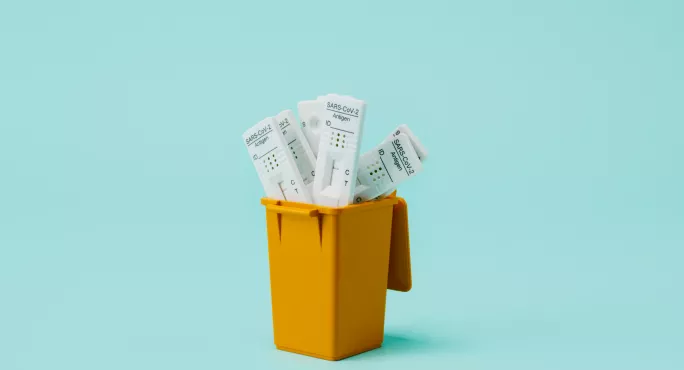
End of Covid rules: What schools need to know

In Parliament today, the prime minister unveiled his plans for an end to legally mandated isolation and free testing for most of the public.
The Department for Education later published a blog and updated guidance setting out the changes in more detail.
Here are the main changes for schools.
Asymptomatic testing
As reported earlier, the recommendation for students and staff in most education settings to undertake twice-weekly asymptomatic testing will be removed from today.
The advice for regular testing will, however, remain for secondary-age students and above in specialist special educational needs and disability (SEND) settings, alternative provision, and SEND units in mainstream schools or the equivalent in colleges.
As the advice for testing remains in these specialist settings, free tests will be accessible through the usual channels after 1 April.
Previously, secondary students and staff, and early years staff were encouraged to test twice a week.
When might testing return?
In the case of an outbreak, schools may be advised by their local public health team to recommend lateral flow testing.
This advice could include nurseries, primary schools, secondary schools and FE settings for targeted groups of staff and pupils in the event of an outbreak, only if testing measures have been advised or agreed by a director of public health or local health protection team.
Primary-age children should not undertake asymptomatic testing through the educational setting, according to the guidance.
The Contingency Framework, which sets out the principles for managing local outbreaks of Covid-19 in education and childcare settings, remains in place for schools.
End to the legal requirement to isolate
The legal requirement to self-isolate after a positive Covid test will also end this Thursday (24 February).
After this date, pupils and staff who test positive will, however, be advised to remain at home for at least five full days and then continue to follow the guidance until they have received two negative test results on consecutive days.
- Omicron: Primaries tighten Covid rules as cases soar
- Heads: DfE Covid rules ‘actively help spread virus’, say heads
- Unions: Ending Covid rules risks school chaos, PM warned
The Department for Education said that anyone with any of the main Covid-19 symptoms should order a test and is advised to stay at home while waiting for the result.
The prime minister said the changes were part of moving from “government restrictions” to “personal responsibility”.
At a Covid briefing this evening, chief medical officer Professor Sir Chris Whitty said people should still isolate if they have Covid-19.
“As we look at the next weeks, we still have high rates of Omicron and I would urge people in terms of public health advice, and this is very much the government’s position, that people should still if they have Covid try to prevent other people getting it and that means self-isolating.
“So, that is the public health advice. It would have been the public health advice, and will be the public health advice, for multiple other diseases,” he said, describing it as “standard public health advice for a significant and highly transmissible infection”.
Professor Whitty also said that maximising ventilation, hand-washing and using face coverings in enclosed spaces with large numbers of people when there are significant numbers of cases remain important.
Who will receive free tests?
After 1 April, free symptomatic and asymptomatic testing will end for the general public. After this date, only the elderly and most vulnerable will receive free testing.
The move comes after the Unison, Unite and GMB unions, which represent school support staff, warned that scrapping isolation rules and free tests could result in chaos in schools.
The three unions are warning that the failure to provide clear, detailed guidance risks a “super spreader free-for-all” in schools and other workplaces.
And Geoff Barton, general secretary of the Association of School and College Leaders, today warned that the change in the rules on isolation opened the door for conflict between schools and parents, where families interpreted symptoms that may or may not be the coronavirus “differently from their child’s teachers”.
You need a Tes subscription to read this article
Subscribe now to read this article and get other subscriber-only content:
- Unlimited access to all Tes magazine content
- Exclusive subscriber-only stories
- Award-winning email newsletters
- Unlimited access to all Tes magazine content
- Exclusive subscriber-only stories
- Award-winning email newsletters
You need a subscription to read this article
Subscribe now to read this article and get other subscriber-only content, including:
- Unlimited access to all Tes magazine content
- Exclusive subscriber-only stories
- Award-winning email newsletters
- Unlimited access to all Tes magazine content
- Exclusive subscriber-only stories
- Award-winning email newsletters



